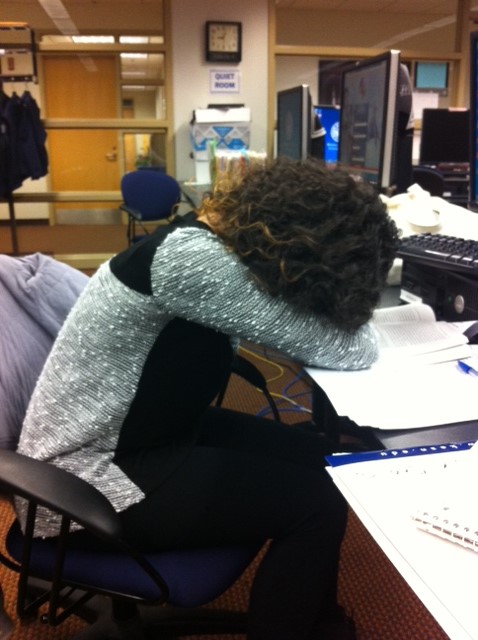By: Sonia Aquije
Sleep is sacred to college students. They often run on six hours or less of sleep; it’s sleep deprivation at its best. Scheduling, work and class take a heavy toll on college students, often leaving them at the mercy of their professors.
The American College Health Association produced data that shows 40 percent of students feel rested only two days a week and 70 percent of college students get less than eight hours of sleep a night.
Sleep deprivation can lead to stress, lower immune system, weight gain, mental health issues, and a lower GPA.
Josh Werber, a sleep and snoring specialist, believes sleep is essential to get through the day, according to an article on livescience.com by Marc Lallanilla.
“Sleep is a very important restorative process,” said Werber in the livescience.com article. “And when we’re not fully engaged in it, and not getting the amount we need, we’re not having the same restorative effect on our brains. And that affects out cognitive ability the next day.”
Jose Torres, a senior political science major, gets about six to eight hours of sleep. He sacrifices sleep for career security.
“I sacrifice sleep in order to study,” said Torres. “If my social life wasn’t as demanding or I wasn’t working so hard on securing a career for my future after I graduate, I would get as much sleep as I need.”
Sleep deprivation has also affected his mood negatively.
“I’m usually cranky and irritable,” said Torres. “A large cup of coffee and the drive to school and music helps my mood [more] than you would think.”
Joshua Martin, a junior finance major, gets an average of six hours of sleep. For him, sacrificing sleep is essential in order to get work done.
“Two to four days a week is sacrificed in order to get school work done or even to study,” said Martin.
A lack of sleep has also affected his performance in class.
“It makes class time feel longer than it usually is and it messes with my concentration when I do work,” said Martin. “I try my best to stay focused; I wash my face to wake up or drink something with sugar in it to feel more alert.”
Brianna Bonds, a junior communication studies major, sleeps an average of six hours.
“I feel cranky, annoyed and lazy when I don’t get enough sleep” said Bonds.
Participating in class takes effort for him.
“I don’t really feel like talking in class or taking notes when I’m tired,” said Bonds.
A lack of sleep has also affected Bonds’ work performance.
“I work at the library computer lab and when I’m tired I barely get work done,” said Bonds. “I don’t feel like helping anyone because I don’t feel like being there.”
Tanisha Simmons, a junior biology education major, gets an average of six hours of sleep.
“I only feel well rested once a week; that’s Saturday,” said Simmons. “I wake up at 8:30 a.m. on average.”
Her grades have been affected for the worse.
“Drastically, my grades have decreased,” said Simmons. “I feel like I can’t do anything; I’m so confused when I get little sleep.”
She can’t get throughout the day without at least minimal sleep.
“I fall asleep wherever I sit and that’s really bad,” said Simmons.
Although college students are always on the run, they should remember sleep is very important to remain sane.
